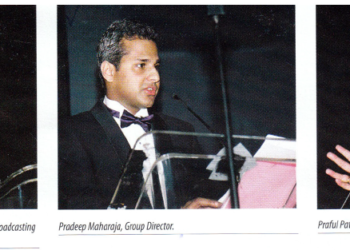By Dinesh Weerakkody
Many top listed public companies have statements in their annual reports that says their people are the most valuable asset and they are committed to human resource development, but in reality many of them do not even have competent HR Professionals managing their HR departments leave alone having a person who has some conceptual understanding of HRM at board level to raise the level of intellectual rigour of the table when discussing people issues at Board meetings. It was Jack Welch who once said HR is the key job and my HR Head is at the table with me for every important decision. Today there is ample evidence to support this argument. For example in researching what drives corporate value, the Forbes/Ernst & Young Value Creation Index found the one of the top key factors to be the firm’s ability to attract and Manage talented employees. Therefore a firms Human Resource should be the centre of any business- it’s the only sustainable advantage. Everything else can be replicated by competition. Human capital as we all know is the foundation of value creation. Perhaps the current lack of awareness among CEOs stems from the fact that most HR managers they have recruited do not have a clue on how HR can add wealth-creating value to a firm. So I think it is time HR professionals came out of the comfort zone and become part of the business execution and there by propel HR into a meaningful role.
A happy workforce can reward a company through better profits, better productivity and lower staff turnover. Also there is no special magic in being a good employer. It does not necessarily take money, size, or market to become an employer of choice.
HR NOT FOR DUMMIES
Most businesses in Sri Lanka are today very much people businesses. So at the front-end companies need to make sure they are getting the best people and have the competence to inspire and motivate employees to release their discretionary effort beyond the call of duty. In today’s context companies have to work very hard to find good talent because there is a short supply of good talent. So when they find the right talent with the right profile they would have to make sure that they are not only offering very competitive compensation package, but also the kind of culture, development and other benefits that makes the company the kind, people want to work for. The challenge for any company is to create the kind of environment where, when they (staff) get up in the morning they can actually look forward to coming to work. Also CEOs are no longer judged by the grandeur of their speeches, instead they are judged more by the ability to get people to work together to deliver business results. That requires good people skills on the part of the CEO.
The former CEO of Toyota articulated this concept well when he said, ” it is not the system that matters, it is the spmt tltat supports the system that is important and cultivating spirit is a far more difficult challenge than managing things”. It calls upon competencies of character more than technical expertise among our CEOs. It relies upon on higher order abilities to create unity and harmony, to instill trust, to create hope and optimism and to work from a base of shared values and interdependence. Leadership of this type is often indirect and behind the scene vs. from the front and top down. Today motivating people is very different to what it was some years ago, because nowadays, oversees assignments, stock options, casual dress and free gyms are just as important to attracting and retaining talented employees as salaries, job security and holidays once were. A happy workforce can reward a company through better profits, better productivity and lower staff turnover. Also there is no special magic in being a good employer. It does not necessarily take money, size, or market to become an employer of choice. Rather, enlightened HR policy and leadership that is committed to its staff is all that one needs. It was the National Panasonic founder Matsushita who said many years ago “take care of the people in the company, they will take care of their customers, and then the customers will take care of the cash flow.” Perhaps some of our CEOs should reflect on that statement before they go round saying people are their most valuable asset and we spend so much money on training .
THE CEO MUST CHANGE
Many CEOs still substantially underestimate the importance of HRM when the responsibility for good HRM lies with the CEO. They never realize that it is organizational capabilities that crea.te products and services that result in a customer taking money out of their wallets and putting it into ours instead of giving it to their competitors. Therefore a Chief Executive should be committed to creating and sustaining value through people. Secondly he must have some understanding as to how HR can create and deliver value to the business. Thirdly he must get his HR teams to make a strong contribution to the share price and the development of the company. However, the real problem is that most CEOs do not know how to increase their organization’s competence. As a result the HRs influence in the organization tends to get marginalised. At the end of the day as Jack Welch said it is the CEOs responsibility to drive his HR teams to create and deliver value. Furthermore there is so much evidence that good HR practices help to unlock the full value of people capability to deliver business results, and since CEOs are accountable for delivering the numbers they should champion good HR practices in their organization. Most companies in Sri Lanka are still behind when it comes to inspiring people and providing the personal sense of passion that count so heavily for a meaningful work experience and for good business performance. Good HRM helps to make the whole company greater than its sum parts.
EMERGING ROLE FOR
HR PROFESSIONALS Now for the CEO to take the HR professionals within their business seriously the HR leadership should focus more on deliverables than on doables and activities. The key deliverables are organization capabilities and intangibles that define the organization’s identity and personality, and by that deliver high performance to all stakeholders. HR Professionals need to align HR practices to more effectively execute business strategy. Therefore HR professionals who demonstrate the right competencies and play the right roles will be more effective than those who do not. Therefore the knowledge and skills and ability that HR professionals need to demonstrate to impact company performance, HR heads will have to develop fast if they are to transform the HR function. HR professionals should be both generalists and specialists. That is HR professionals are employee champions charged with making sure the employer and employee relationship is one of reciprocal value, secondly they are responsible for building the future work force as human capital developers, thirdly they are functional experts, designing and delivering HR Practices to create organizational capability. Lastly as strategic partner they help the CEOs to achieve business goals. Also in addition to all this they must be credible leaders. When HR Professional masters’ these roles they can deliver value to the business and there by get invited to sit at board level.
CHALLENGES FOR HR LEADERSHIP
The first challenge for HR is how does one organize a HR function? HR heads should align their departments with the organizations they serve and match their resources with the busi ness requirements. The second challenge is how do companies develop more capable HR professionals and departments? HR has its own set of competencies like any other function. So any gaps in the competency set need to be filled. That requ.ir learning and development. The third challenge HR professionals are facing today is to decide what HR functions they should outsource and whether they should invest in e-HR service ? Many attempts at HR transformation start with out defining value. For example some companies invest in e-HR services such as portals and online HR services and then believe that they have transformed HR, but they have only made HR more complex for the user. While e-HR may be a part of an overall transformation, it is merely a way to deliver some of the personnel administration services. Moving towards outsourcing does not mean HR has been transformed. If new delivery mechanisms provide basically the same old HR services, the function has only changed, but not transformed itself to deliver an improved service. Whether it is outsourcing or automating HR services the change must be to improve life for key stakeholders in ways that they are willing to pay for. The other argument for outsourcing is that it provides an opportunity for HR Professionals to expand their strategic role.
In the final analysis, HR teams will have to work hard to get and keep talent, engage the workforce to go beyond the call of duty. Finally learn to use e-HR that is enabling a stategic HR IT focus to imrpvove service delivery for cost reduction and e-learning. Then the challenge for the CEO is to get HR to be an integral part of the business in order to help him unlock the full value of the people capability.





